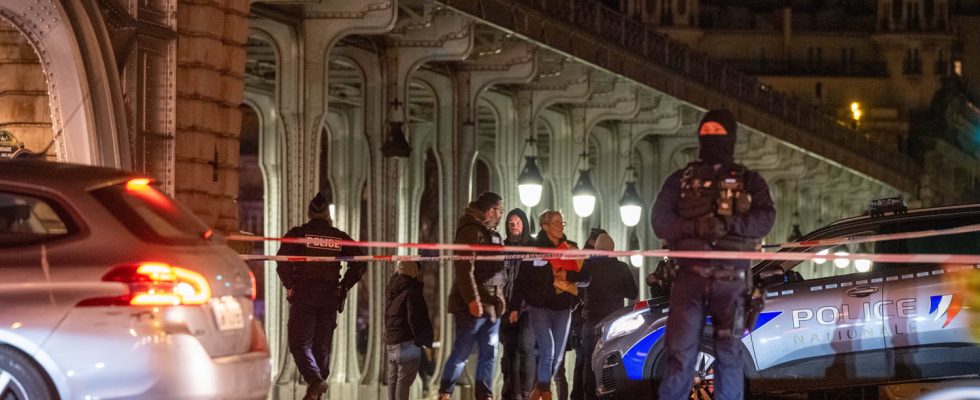Known for Islamist radicalization and suffering from mental disorders, Armand Rajabpour-Miyandoab claims responsibility for the attack perpetrated in Paris on December 2. Already convicted, he said he had a “hatred” for Islamists since his release in 2020.
He was already known to the intelligence services for his Islamist radicalization and the authorities knew of his psychiatric disorders, but he managed to carry out a suspected terrorist attack. Armand Rajabpour-Miyandoab is the assailant of the knife and hammer attack perpetrated in the 15th arrondissement of Paris, between the Quai de Grenelle and the Bir-Hakeim bridge, on the evening of Saturday December 2. An attack which left one dead and two injured and before which the 26-year-old author pledged allegiance to the Islamic State in a video posted on social networks. Fiché S and already convicted of criminal association in a previous attack plan in 2016, who is Armand Rajabpour-Miyandoab and how was he able to carry out the act without being detected?
A hidden Islamist radicalization?
French born in 1997 to atheist Iranian parents, Armand Rajabpour-Miyandoab converted to Islam and became closer to the radical movement until participating in a planned attack in the Parisian district of La Défense in 2016. Arrested and sentenced to five years in prison, one of which was suspended, placed on probation and under surveillance for this attempted attack, the Franco-Iranian was released in 2020. A few months later, during the assassination of Samuel Paty, in October 2020 , Armand Rajabpour-Miyandoab, went to the police station to indicate that he had been in contact with the author of the professor’s assassination on X (former Twitter). He then explained to the police that he had a “hatred against Islamists who openly or not call for violence” and that he had “distanced himself from religion” during the year of isolation that he experienced in prison, as reported The Parisian. And added: “I now know how enlistment happens and I will no longer let myself be influenced, and I am well surrounded by psychologists, educators, mediators…”
Armand Rajabpour-Miyandoab’s family says they witness the change in the young man after his release. “He took the right path. He has matured since his detention, he is more affectionate than before. Above all, he feels 100% French, he came out with a love for France. […] He hates this Islamist ideology, he suffered from his detention,” she declared in a hearing at the DGSI consulted by the Ile-de-France newspaper. However, in October 2023, the young man’s mother reported the behavior of her son who “withdrew into himself” then estimated that he was better only a few days later, said the anti-terrorism prosecutor Jean-François Ricard, during of a press conference Sunday evening.
As for the specialists of the Pairs-Paris system who were responsible for following Armand Rajabpour-Miyandoab in his process of ideological disengagement, several of them were indicated in Médiapart : “We did not believe in the deradicalization of Rajabpour. He was certainly very polite, but very closed, silent. And others added: “He did not seem to me to be in a break with his jihadist commitment, complete a second. He didn’t give us a feeling of security when we were with him…”
Untreated psychiatric disorders?
With the radicalization of the suspect, his psychiatric disorders were also highlighted. The 26-year-old man developed problems during his incarceration according to the profile drawn up by investigators. Armand Rajabpour-Miyandoab did have drug treatment which continued after his release, until he stopped taking it in agreement with his doctor in 2022. The national anti-terrorism prosecution then requested a new psychiatric expertise which concluded in August 2022 with the necessary follow-up and an order for treatment. But the coordinating doctor did not share this opinion and according to the last report submitted in April 2023, no psychiatric danger had been identified.
After the suspect’s mother reported it last October, she refused to forcibly hospitalize her son. Would medical treatment for the assailant have prevented the attack? This is a hypothesis considered by the Minister of the Interior who denounced a “psychiatric failure” on BFMTV-RMC on December 4. But despite the diagnosis of mental disorders, the suspect’s Islamist radicalization occurred before the development of psychiatric problems and is not a consequence of these disorders. The members of the Pairs-Paris system also believe that the individual “is not crazy” and is “absolutely not decompensated”.
Links with several jihadists
Armand Rajabpour-Miyandoab has been in contact with other radicalized individuals, including some known as jihadists. The man spoke with Abdoullakh Anzorov, the killer of Samuel Paty, in October 2020 after the publication of a video of the Chechen terrorist on X and only a few days before the attack in the Yvelines college. During this exchange, the two men would have debated on Islamist ideology, the suspect claiming to have turned away from it and not having given in to the Chechen’s proselytism, according to statements by Armand Rajabpour-Miyandoab to the police during his hearing.
But the suspect had had contact with other radicalized individuals before his participation in a planned attack in 2016. The man first met Maximilien Thibaut, who left with his wife and children to join the Islamic State in 2015 , barely a few months before the jihadist’s departure. The father then allegedly pushed the suspect to commit a terrorist act, recalls Médiapart. Shortly after, Armand Rajabpour-Miyandoab began associating with jihadist groups online. The suspect also spoke with Larossi Abballa, the killer of the police couple killed in Magnanville in 2016, and with Adel Kermiche, one of the terrorists responsible for the death of Father Hamel in Saint-Étienne-du-Rouvray in 2016. C It is also because of his contacts with Adel Kermiche that the man was convicted of criminal association with a view to preparing an act of terrorism.
